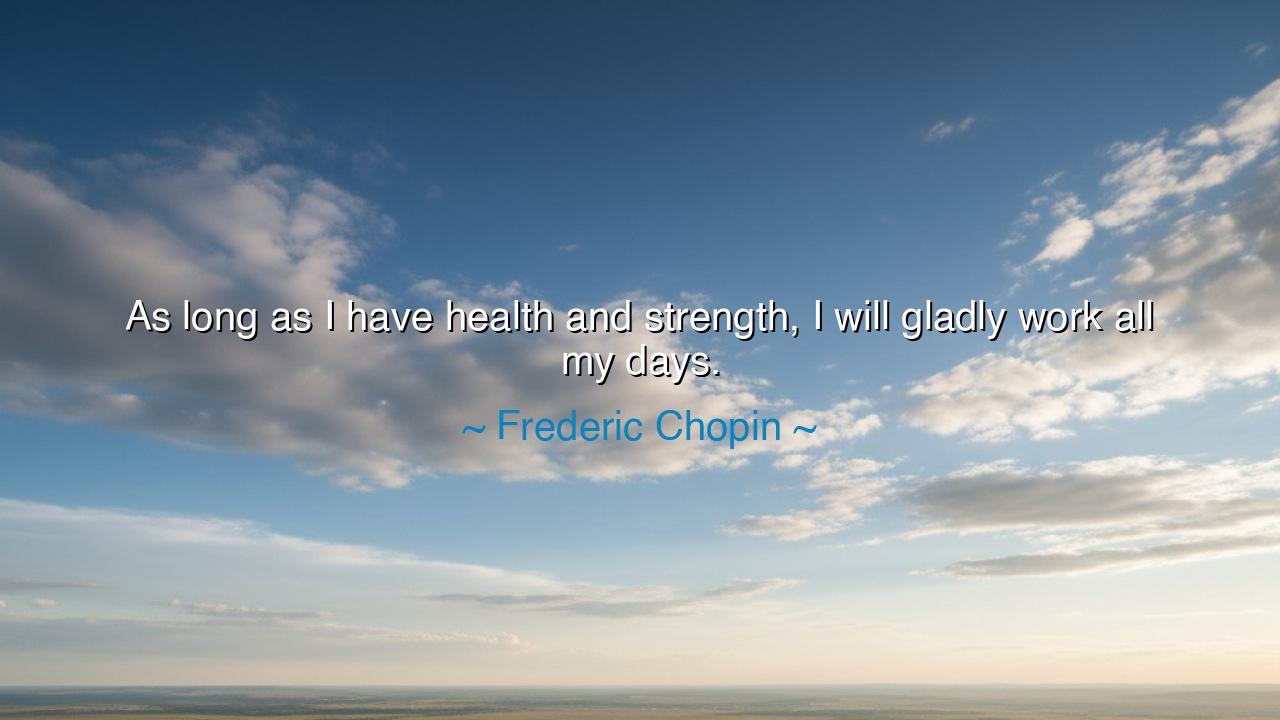
As long as I have health and strength, I will gladly work all my






The great composer Frédéric Chopin, whose music still whispers through the hearts of men and women long after his passing, once said: “As long as I have health and strength, I will gladly work all my days.” These words, simple yet radiant, reveal the soul of a man who understood that work, when born of love and purpose, is not a burden but a blessing. Chopin’s declaration is not the boast of ambition, but the vow of devotion—a promise to serve his art as long as life and breath allowed. In this, he speaks the language of the ancients: that to labor with joy, to create with heart, is to honor both the gift of life and the divine spark within.
In the world of the ancients, labor was not merely toil; it was sacred. The Greek philosopher Aristotle taught that happiness, or eudaimonia, was found not in idleness, but in the noble exercise of one’s gifts. To work was to express the essence of the soul—to transform the invisible fire of thought into something tangible and enduring. So it was with Chopin. For him, music was not a career but a calling. His health was frail, his body weak, but as long as his hands could still move and his heart could still feel, he labored with passion and grace. His statement becomes a hymn to perseverance, to the artist’s eternal struggle to give beauty to the world despite the weight of mortality.
Chopin lived in constant battle with illness, his lungs ravaged by disease, his body delicate as glass. Yet even in weakness, he continued to compose, teach, and play. He knew that each sunrise might be his last, but instead of despairing, he filled his days with music. His melodies—tender, sorrowful, transcendent—were born not from ease, but from endurance. And thus, his words take on deeper meaning: “As long as I have health and strength, I will gladly work all my days.” For him, work was not the enemy of life—it was the proof of life. Each note he wrote was an act of defiance against decay, a declaration that the spirit is greater than the body that carries it.
There is an ancient story that mirrors Chopin’s spirit—the tale of Hephaestus, the lame god of the forge. Though cast down from Olympus and crippled by pain, he never ceased his craft. With fire and hammer, he forged beauty from suffering: the armor of Achilles, the scepter of Zeus, the jewelry of Aphrodite. He, too, worked not because it was easy, but because creation itself was his joy, his reason for being. In Hephaestus and Chopin, we see the same truth: that work done with love transforms suffering into art and hardship into meaning.
To work gladly, as Chopin vowed, is not to chase endless labor for gain—it is to recognize that our greatest fulfillment comes from using our gifts. The wise know that health and strength are not possessions to be hoarded, but instruments to be played. The body is the tool; the spirit, the craftsman. As long as one has the power to act, to create, to serve, life retains its radiance. The moment we cease to use our strength for good, it begins to fade. Thus, Chopin’s words are both a prayer and a reminder: to cherish every breath as an opportunity to shape something worthy of the world.
His life also teaches the harmony between gratitude and effort. To “gladly work” is to meet each day not with complaint, but with reverence. It is to see in every act of labor—not just in art or music, but in the tending of a garden, the raising of a child, the teaching of a lesson—a form of worship. For the ancients believed that to work well was to honor the gods. Chopin, in his quiet way, worshiped through melody. His piano was his altar, his music his offering. And through this devotion, he achieved immortality, for his work still moves hearts across the centuries.
So, let this be the lesson: do not waste your health nor neglect your strength, for they are not eternal. While you can move, create. While you can think, dream. While you can love, serve. Do not wait for perfect conditions to begin, for perfection never comes. Let your labor, whatever it may be, be filled with joy, as Chopin’s was—with gratitude that you are alive and able to give. For when the day comes when your strength is gone and your work is done, you will have left behind something that will continue to sing long after your voice is silent.
Thus, Frédéric Chopin’s words are not merely about the discipline of the artist—they are a philosophy of life itself. To work with joy is to live with purpose; to persist despite frailty is to touch eternity. Let us, then, take his vow upon ourselves: As long as we have health and strength, let us gladly work all our days. For through such work, we do not merely survive—we become immortal in the hearts of those who follow.






AAdministratorAdministrator
Welcome, honored guests. Please leave a comment, we will respond soon